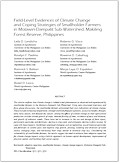| Journal Article |
 |
|
| Article Title | Field-Level Evidences of Climate Change and Coping Strategies of Smallholder Farmers in Molawin-Dampalit Sub-Watershed, Makiling Forest Reserve, Philippines | | Author | Leila D Landicho, Roselyn F. Paelmo, Romnick S. Baliton, Rodel D. Lasco, Roberto G Visco, Rowena D. Cabahug and Marya Laya O. Espaldon | | Year | 2015 | | Journal Title | Asian Journal of Agriculture and Development | | Institution | Southeast Asian Regional Center for Graduate Study and Research in Agriculture | | Volume | 12 | | Issue | 1 | | Pages | 81-94 | | Call Number | JA0642-15 | | Keywords | adaptive capacities, smallholder farmers, climate change impacts, Molawin-Dampalit Sub-Watershed |
|
| Abstract: |
| This article confirms that climate change is indeed a real phenomenon as observed and experienced by
smallholder farmers in the Molawin-Dampalit Sub-Watershed. Using semi-structured interviews and
focus group discussions, the smallholder farmers articulated their own indications of climate change.
These include increasing temperature, stronger and more frequent typhoons, excessive rainfall, drought,
early rainy season, and delayed dry season. Among the effects of climate change on their agricultural
production include stunted growth of crops, aborted fruiting of trees, incidence of pests and diseases,
and growth of unknown weeds. These have led to increase in the use and dosage of farm inputs,
particularly pesticides and fertilizers; decline in crop yield; and ultimately, decline in farm income. To
cope with these impacts, the farmers employed strategies such as replanting, use of chemical pesticides
and fertilizers to control pests and improve crop growth, pruning, watering and diversion of water
source, changing crops, and harvesting their crops earlier to minimize crop loss. Considering the
vulnerability of smallholder farmers, the results suggest the need to enhance their adaptive capacities
for climate change impacts using a holistic approach via human capital development, improvement of
physical capital, and building their social capital. |
|